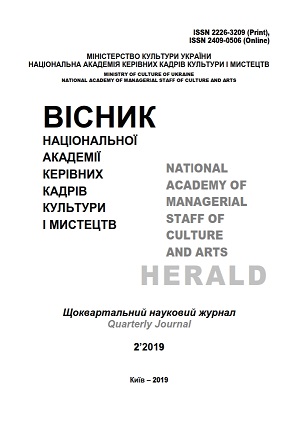Особливості наукового та релігійного світоглядів: культурологічний аспект
Features of the Scientific and Religious Worldview: Cultural Aspect
Author(s): Julia Sergeevna Sabadash, Svitlana Anatoliyivna PanchenkoSubject(s): Social Philosophy, Philosophy of Religion, Philosophy of Science, Culture and social structure , Sociology of Culture, Sociology of Religion
Published by: Національна академія керівних кадрів культури і мистецтв
Keywords: worldview; science; culture; religion; faith; secularization;
Summary/Abstract: The purpose of the article is to explore the features of the scientific and religious worldviews, focusing on the cultural aspect. The research methodology consists in the application of historical, cultural, systematization, cultural and theoretically generalizing methods. These methods allow us to reveal the dynamics of personal development and prove the dependence of changes in the worldview and the spiritual life of people with the dominance of the religious or scientific worldview. The research methodology consists in the application of historical, cultural, systematization, cultural and theoretically generalizing methods. These methods allow us to reveal the dynamics of personal development and prove the dependence of changes in the worldview and the spiritual life of people with the dominance of the religious or scientific worldview. Scientific novelty lies in the develop of theories to overcome the crisis of man-made civilization. Namely, the developments of certain criteria, which allow generalizing and streamlining the accumulated experience of the relationship of man to nature and the cosmos, knowledge and faith, to his personal and collective responsibility, using the scientific and religious outlook not as antagonistic, but as two fundamental massifs of culture, complement each other. Conclusions. Scientific and religious sources are organic components of universal cultural integrity, and humanity today should look for signs of unity of philosophy, morality, spirituality, and art, and superstition and ignorance should be objects of constructive criticism both from the side of religion and at the scientific level. Secular and religious culture is intended to unite the service of the ideals of humanity, mercy, non-violence. Understanding the tragic pages of history, the pursuit of a better national destiny, the search for a way out of economic, political and ideological crisis situations, the solution of environmental problems are the most important priorities for all people, regardless of their personal attitude to religion or science. Only high-level discourse leads to understanding, changing outdated paradigms, to creative cooperation and, as a result, to the conscious preservation and dynamic development of culture.
Journal: Вісник Національної академії керівних кадрів культури і мистецтв
- Issue Year: 2019
- Issue No: 2
- Page Range: 112-116
- Page Count: 5
- Language: Ukrainian

